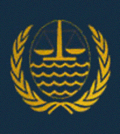- International Tribunal for the Law of the Sea
-
Der Internationale Seegerichtshof (engl. International Tribunal for the Law of the Sea; französisch Tribunal international du droit de la mer) ist ein internationales Gericht, das auf der Grundlage des Seerechtsübereinkommens der Vereinten Nationen von 1982 mit Sitz in Hamburg im Stadtteil Nienstedten errichtet wurde. Seine 21 Richter werden von den Vertragsparteien gewählt. Er nahm 1996 seine Arbeit auf. Präsident ist seit Oktober 2008 der kapverdische Völkerrechtler José Luis Jesus.[1]
Während der Internationale Gerichtshof in Den Haag lediglich für Streitigkeiten zwischen Staaten zuständig ist und in dieser Hinsicht eine Konkurrenz für seerechtliche Streitigkeiten darstellt, kann der ISGH unter bestimmten Voraussetzungen auch von Privatpersonen und Internationalen Organisationen angerufen werden. Er steht damit nicht nur den Vertragsparteien des Seerechtsübereinkommens offen. In der Tätigkeit des Tribunals hat diese Möglichkeit bislang allerdings keine Rolle gespielt.
Dem ISGH wurde mit der UN-Resolution 51/204 vom 17. Dezember 1996 Beobachterstatus bei der Generalversammlung der Vereinten Nationen zugesprochen und somit die Teilnahme an Sitzungen der Generalversammlung garantiert, wenn Themen behandelt werden, die den Seegerichtshof betreffen.
Das Gebäude wurde nach Entwürfen des Architekturbüros von Branca, München, in den Jahren 1997 bis 2000 errichtet; die Übergabe des Gebäudes erfolgte am 3. Juli 2000 durch Schlüsselübergabe an Kofi Annan, dem damaligen UN-Generalsekretär. Die Bausumme betrug 123 Mio DM (80 % übernahmen die Bundesrepublik, 20 % Hamburg, die Betriebskosten tragen die Vereinten Nationen). Beim Bau blieb die denkmalgeschütze Schröder’sche Villa erhalten und wurde in die Gesamtanlage einbezogen.
Inhaltsverzeichnis
Derzeitige Mitglieder
Name Geburtsdatum Herkunftsland Ende der Amtszeit José Luis Jesus 20. September 1950 Kap Verde 30. September 2017 Helmut Türk 24. April 1941 Österreich 30. September 2014 Hugo Caminos 16. März 1921 Argentinien 30. September 2011 Vicente Marotta Rangel 14. März 1924 Brasilien 30. September 2017 Alexander Yankov 22. Juni 1924 Bulgarien 30. September 2011 L. Dolliver M. Nelson 27. Juni 1932 Grenada 30. September 2014 P. Chandrasekhara Rao 22. April 1936 Indien 30. September 2017 Joseph Akl 5. August 1936 Libanon 30. September 2017 Rüdiger Wolfrum 13. Dezember 1941 Deutschland 30. September 2017 Tullio Treves 20. September 1942 Italien 30. September 2011 Tafsir Malick Ndiaye 7. Februar 1953 Senegal 30. September 2011 Jean-Pierre Cot 23. Oktober 1937 Frankreich 30. September 2011 Anthony Amos Lucky 11. Mai 1940 Trinidad und Tobago 30. September 2011 Stanislav Pawlak 27. September 1933 Polen 30. September 2014 Shunji Yanai 15. Januar 1937 Japan 30. September 2014 James Kateka 29. April 1945 Tansania 30. September 2014 Albert Hoffmann 18. Mai 1955 Südafrika 30. September 2014 Zhiguo Gao 7. Juli 1955 China 30. September 2011 Boualem Bouguetaia 21. September 1946 Algerien 30. September 2017 Vladimir Vladimirovich Golitsyn 27. September 1947 Russland 30. September 2017 Jin-Hyun Paik 1. Februar 1958 Südkorea 30. September 2014 → Liste der Richter am internationalen Seegerichtshof
Der Belgier Philippe Gautier ist seit dem 21. September 2001 als Kanzler (engl.: Registrar) beim Gerichtshof tätig. Er folgte Gritakumar E. Chitty aus Sri Lanka, der das Amt von 1996 bis 2001 inne hatte. Als sein Stellvertreter fungiert Doo-young Kim aus Südkorea.
Quellen
- ↑ http://www.itlos.org/news/press_release/2008/press_release_125_en.pdf Offizielle Pressemitteilung des Gerichtshofs vom 1. Oktober 2008
Literatur
- Christoph F. Bornhorn: Der Internationale Seegerichtshof. Flaggschiff oder Geisterschoner? Berlin 1999. ISBN 3980391159.
- Moritz Karg: IGH vs. ISGH. Die Beziehung zwischen zwei völkerrechtlichen Streitbeilegungsorganen. Baden-Baden 2005. ISBN 3832914455.
- Wasum-Rainer, Susanne / Schlegel, Daniela: The UNCLOS Dispute Settlement System: between Hamburg and The Hague, in: German Yearbook of International Law 48 (2006) S. 187–222.
- Rah, Sicco / Wallrabenstein, Tilo: The International Tribunal for the Law of the Sea and Its Future, in: Ocean Yearbook 21 (2007), pp. 41–67.
Siehe auch
Weblinks
- Offizielle Website des ISGH (englisch, französisch)
- Internationale Stiftung für Seerecht (deutsch, englisch)
- United Nations Convention on the Law of the Sea (Seite englisch; Dokumente in UN-Sprachen: englisch, französisch, ...)
53.5511111111119.8508333333333Koordinaten: 53° 33′ 4″ N, 9° 51′ 3″ O
Wikimedia Foundation.





